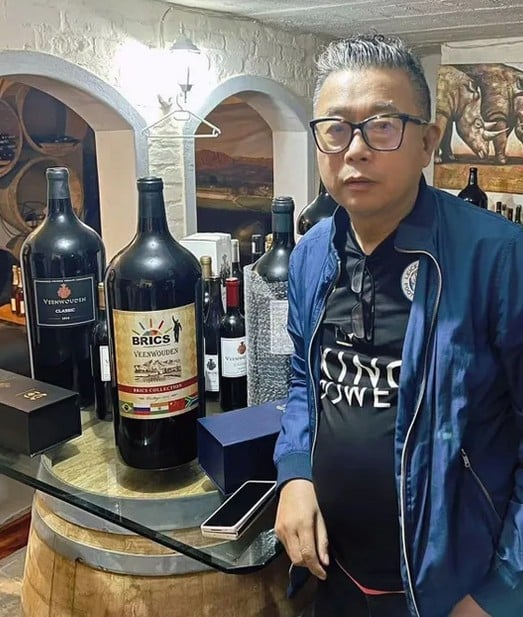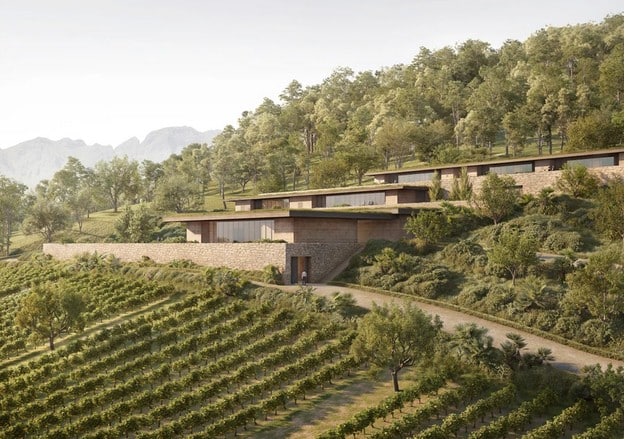Tim James: Rediscovering two mysterious wine producers
By Tim James, 29 September 2025

6
It would not be surprising if any moderately youthful wine lover in South Afrca had never heard of Veenwouden or 4G Wines, and I’d bet that very few who did know the names could confidently say that they knew of the wineries’ continued existence. I spent many hours these last few days seeking a complete answer to the latter question.
My interest came as I was browsing through some of my earlier articles. Recently I’ve been trying to bring order to these – there are an almost shocking number: for various periods in the first fifteen years or so of this century, when print journalism was more lively than now, I was contributing regularly to the Mail&Guardian weekly newspaper, to the satirical-investigative magazine Noseweek, a horse-racing magazine – believe it or not – called Parade, World of Fine Wine, occasional pieces elsewhere, and most frequently, to Grape once it went solely online. Anyway, I realised that, while I was chronicling (if that’s not too grand a word) the development of the Cape wine revolution, there were numerous examples of wineries changing their reputations, sometimes fairly radically, and even some cases of wineries fading entirely from sight.
Like Veenwouden, a Paarl winery founded in 1983 by the internationally famous opera singer Deon van der Walt. In the first Grape poll of wine professionals on the top Cape producers, in 2001, Veenwouden came in at number three amongst the top five (behind Kanonkop and Vergelegen and ahead of Neil Ellis and Rustenberg). In the poll two years later it was still in the top 20. But domestic tragedy struck in late 2005, when Deon’s father shot him dead, and then himself. This didn’t do much good to the business, though it continued. I noted in 2012 that Veenwouden’s reputation was declining. At some stage it became clear that the farm and the brand had been bought by the South Africa-based Chinese entrepreneur William Wu. He now says this happened in 2010, but if so it was clearly secretly done at first – Platter’s still listed the Van der Walt Trust as owners for some years. The last year its wines appeared in Platter’s was 2016.

So I don’t think I’d heard of Veenwouden for a decade. But I did some googling and came across a Johannesburg Star report about Veenwouden wines being served to all the guests at the BRICS Summit in Sandton in 2023 – a collaboration that began at the 2018 Summit. The brand manager told the Star that 95% of Veenwouden wines are exported to China – which helps explains its lack of presence here (where the remaining 5% goes, I don’t know). I guess that volumes are somewhat greater than would come off the original Paarl estate. It was reported in late 2014 that Wu had bought a controlling stake in Swartland Winery – none of his neighbours there seem to have much idea of what’s going on. But there we are. The Veenwouden brand is clearly doing just fine, but I have no idea what’s happening at the Paarl estate.
As for 4G Estate (as they call themselves, though the “estate” bit seems entirely without legitimacy), there the mystery is of a rather different, deeper kind. The producer came to my notice back in 2011. Up in Johannesburg for Winex, I’d taken Eben Sadie to visit William Kentridge’s studio, and the three of us then went to lunch with Michael Fridjhon. He was generous to us with his excellent cellar, but the first red involved some sips from, as I subsequently wrote, “a sample half-bottle of an apparently hugely expensive wine from Giorgio dalla Cia that had been sent to Michael. Called just G, and with a striking, original label…. The back label extolled the greatness of the wine and the winemaker (“legendary”?) in a way that, as someone said, it would be nice if someone else said those things, but to say them about yourself and your own wine is really a bit off. Lush, fruity, heavily oaked …. Impressive, perhaps, but not to the tastes of any of us, and after our sips, it went off to contribute its expensive plushness to the sauce for the beef.” (Michael got into trouble from Philipp Axt, the German-Swiss owner of the brand, over that last bit!)
That would have been the maiden vintage of G, 2010, selling then for R2,300. After a little interest, I soon forgot about the brand. There were occasional mentions for a few years, mostly because it was so expensive, but it essentially disappeared from sight in South Africa – certainly from mine. Had it simply collapsed in shamefaced silence like, say, the Cape Vintners Classification seems to have finally done? I did some online searching, and had further doubts on finding that the latest release is 2018 – but no, that seems to be their thing (and it’s arguably very laudable to give the wine maturity before release; I only wish more producers would do the same).

And I found the 4G Estate Wine website, recording “a quest to create the finest red wine South Africa has ever known”, and being apparently pretty confident it has done so, bringing “the ‘First Growth of the Cape’ from South Africa to the world”. That would be G (each vintage has a sort of sub-name of somewhat pretentious and/or puzzling character: 2018 is Going, Going, Gone; 2017 is Zwizzirōn; 2016 Le Capitaine; 2015 Venetia’s Heart; etc) ; there’s also a second label called Echo of G, and that’s also “a benchmark of excellence in South African winemaking”.
There’s not, however, much detail easily found about the project. The winery appears to be on good terms with The Drinks Business, which helps, as it has published a gushing intro and an “interview” (open-ended questions and longer answers) with Philipp and Vanessa Axt (“the driving force behind the business”), from which we learn some stuff. There’s no longer mention of legendary Giorgio dalla Cia, so presumably he pulled out at some stage. “Master Winemaker” since the death of the eminent Bordeaux academic and consultant Denis Dubourdieu is his business partner, Valérie Lavigne. As for local input, Vanessa says: “Our highly experienced South Africa team consists of Tian Scholtz as our cellar master and Gustav Andrag as our viticulturist” – though googling and asking my wine-making friends failed to help me find out anything about them or that experience.
We do know that the Bordeaux-blend wines are widely sourced (WO Western Cape is not a hopeful origin for those seeking terroir expression), but the details of origin seem nowhere available – though we know the grapes come off “meticulously selected, low-yielding vineyards”. Nor know where the winemaking (astonishingly, the wines are “”crafted entirely by hand”) takes place. The “fact sheet” that is available on request from the website does not give the usual technical information (ABV, etc) alongside the blandishments.
As far as I know, G has never been judged in the usual local or international forums (though Christian Eedes wrote about the maiden vintage quite positively in 2012) – not by Platter’s, Tim Atkin, Wine Spectator, Decanter, Neal Martin, etc. There are a few very laudatory comments reported – from sommeliers usually, and many from a German wine journalist, critic and “coach” called Giuseppe Lauria. He apparently rated G 2018 at 100 points, and calls the producer a “cult winery” (and certainly seems keen on trying to help it become one).
As to availability: One can approach the producer from the website; Wine-searcher.com lists older vintages available from a handful of German and Swiss shops. And you can even buy the wines locally, from the online shop Port2Port. There are 23 bottles of G Zwizzirōn 2017, the outgoing vintage, in stock at R8,200 (which seems to be the usual mitteleuropa price too), and the same number of 2015 Echo of G for R2,600; there’s also a 2019 husk spirit, The Spirit of G, at R1,690 for 350 ml. I think the wine can also be found at one or two smart restaurants.

Perhaps the most interesting and surprising thing I learnt from my online searches is that 4G Wine Estate is actually establishing something like an estate. It seems they have land in Franschhoek, and will next year be starting to build what looks like a rather spectacular winery. According to Lauria, “Axt raised the money for this from investors in Germany and Switzerland”. Which is interesting if you do the arithmetic. The wines are made in tiny quantities (about 5,000 bottles of G, more of Echo) and, while the prices are high by South African standards, they are not so by international standards for grand wines. Prospects for a return on investment (apart from ego satisfaction of course) seem somewhat less spectacular than the proposed winery. But it is going to be interesting to watch this development.
It is, of course, a noble ambition to want to make a great wine for the ages, and it would be great if the Axts do so with G. But quite apart from all the self-advertisement, and the lack of real presence in its home country, I find it difficult to take seriously, and with serious respect, a project as shrouded in secrecy as this one – and in such a hurry. I remember Eben Sadie saying, many years ago, of his ambitions, that “building a great wine is not the work of one generation”. It’s certainly not the work of a few years of self-aggrandisement, a high price, and a few carefully managed placements and carefully engineered tastings.
- Tim James is one of South Africa’s leading wine commentators, contributing to various local and international wine publications. His book Wines of South Africa – Tradition and Revolution appeared in 2013.






Louis | 29 September 2025
Hard not to see 4G as marketing theatre rather than a real contribution to SA wine. Heavy on self-praise, light on transparency, absent locally, and priced wildly out of step with the market. True greatness comes from time and humility, not a glossy label and an inflated price tag.
Ty | 29 September 2025
I was at a wine dinner last year with Blank Bottle, and 1 of the wines were called confessions of a white glove chaser. The owner Pieter told us the story behind the name which tied into the 4G wines.
He is such a great story teller with some excellent wines
Glen Dirkwood | 29 September 2025
4G is on Eendrag Farm.. above Firgrove, close to Heldervue.. still making wine. Go pay them a visit.
Caroline Rillema | 30 September 2025
Does one need an appointment and if so, who does one contact?
AJ du Toit | 7 October 2025
One just have to drive past Veenwouden to see that there’s nothing left of the once beautiful estate. The buildings are in desperate need of some paint and attention. The vineyards are neglected and a mess.
It’s unlikely that they’re produce a lot, if any, grape from the farm.
The band might still be carrying on, but the farm is ruined.
Brendan Hart | 7 October 2025
I still vividly remember the Veenwouden Merlot 2002. Not a heralded vintage, and not a grape commonly associated with excellence in South Africa, but that was a special wine.